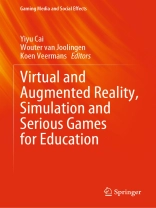This book introduces state-of-the-art research on virtual reality, simulation and serious games for education and its chapters presented the best papers from the 4th Asia-Europe Symposium on Simulation and Serious Games (4th AESSSG) held in Turku, Finland, December 2018. The chapters of the book present a multi-facet view on different approaches to deal with challenges that surround the uptake of educational applications of virtual reality, simulations and serious games in school practices. The different approaches highlight challenges and potential solutions and provide future directions for virtual reality, simulation and serious games research, for the design of learning material and for implementation in classrooms. By doing so, the book is a useful resource for both students and scholars interested in research in this field, for designers of learning material, and for practitioners that want to embrace virtual reality, simulation and/or serious games in their education.
สารบัญ
Introduction.- The Number Navigation Game: an overview of an iterative design process.- The effects of a role-playing game and a software simulation tool on elementary school students’ understanding when modelling feeding relations in ecosystems.- Augmented reality application for chemical engineering unit operations.- The use of immersive virtual reality technology to Deepen Learning in Singapore schools.
เกี่ยวกับผู้แต่ง
Dr. Yiyu Cai is Associate Professor with Nanyang Technological University (NTU), Singapore. He received multi-disciplinary trainings in mathematics, computer graphics, and mechanical engineering. In NTU, he teaches virtual reality, computer-aided engineering, etc. Dr. Cai has over 20 years’ interdisciplinary research experience developing virtual & augmented reality, simulation and serious games technologies and their applications in engineering, medicine and education. His research has been supported by National Research Foundation, Temasek Trust Funded Millennium Foundation, and other public and private sectors in Singapore. He has published over 150 papers in peer-reviewed international journals and conferences and also has edited 6 books or 4 journal special issues. He has served the roles as associate editors or editorial boards with several leading journals. Part of his research innovations was exhibited in Museums or Science Centres locally in Singapore or overseas. He has co-organised near 20 international conferences and given 59 keynotes or invited talks at various international conferences. He has co-invented 5 patents granted or pending approval. He was Elected Co-President of the International Simulation and Gaming Association in 2008.
Dr. Wouter van Joolingen is Professor of science and mathematics education and Scientific Director of the Freudenthal Institute, Utrecht University, the Netherlands. After graduating in physics from Leiden University, he received a Ph.D. in instructional technology from Eindhoven University of technology. Dr. Van Joolingen has over 25 years of research experience in research and development in technology-enhanced learning, in particular the use of simulations and modelling for education. His experience includes co-leading a series of EU projects leading to the landmark systems Sim Quest and SCY that support simulation-based inquiry learning. He is the author of over 150 papers in peer-reviewed journals and conferences, including two much-cited reviews on learning with simulations. He is a member of the editorial board of the International Journal on Science Education and the Journal of Artificial Intelligence and Education and reviews for several other scientific journals. Currently, his research focuses on the use of advanced simulation technology, such as VR and educational games in science education, with a focus on the way new technology can be integrated in classrooms.
Dr. Koen Veermans is University Research Fellow at the Department of Teacher Education and Academic Director of the Education and Learning International Master Programme at the University of Turku, Finland. After graduating in Social Science Informatics at the University of Amsterdam, he received a Ph.D. in instructional technology from the University of Twente, The Netherlands. Dr. Veermans has 20 years of research experience in the field of technology-enhanced learning. His main focus has been onsimulation-based inquiry learning. He led two research projects (SULESLO and Co Si Lab) funded by the Academy of Finland and worked in many EU funded projects around simulation-based inquiry learning. He is currently one of the coordinators of the Inquiry Learning SIG within the European Association on Learning and Instruction (EARLI). In recent years, his research focus has been on the use of simulations and educational games in STEM education, spanning the cycle from design of learning environments, supporting pre- and in-service teachers, to integration into the classroom.












